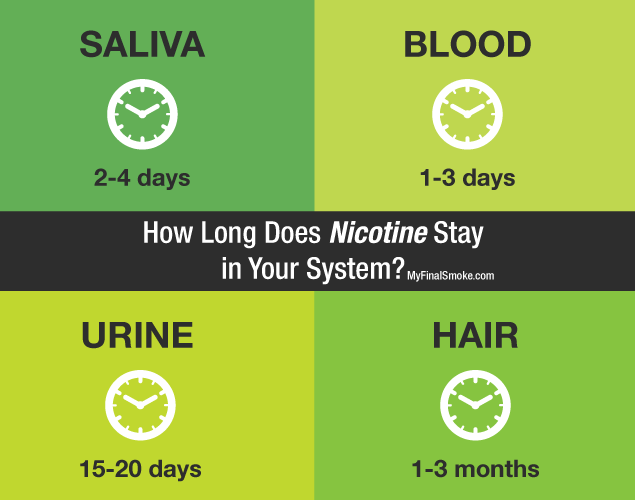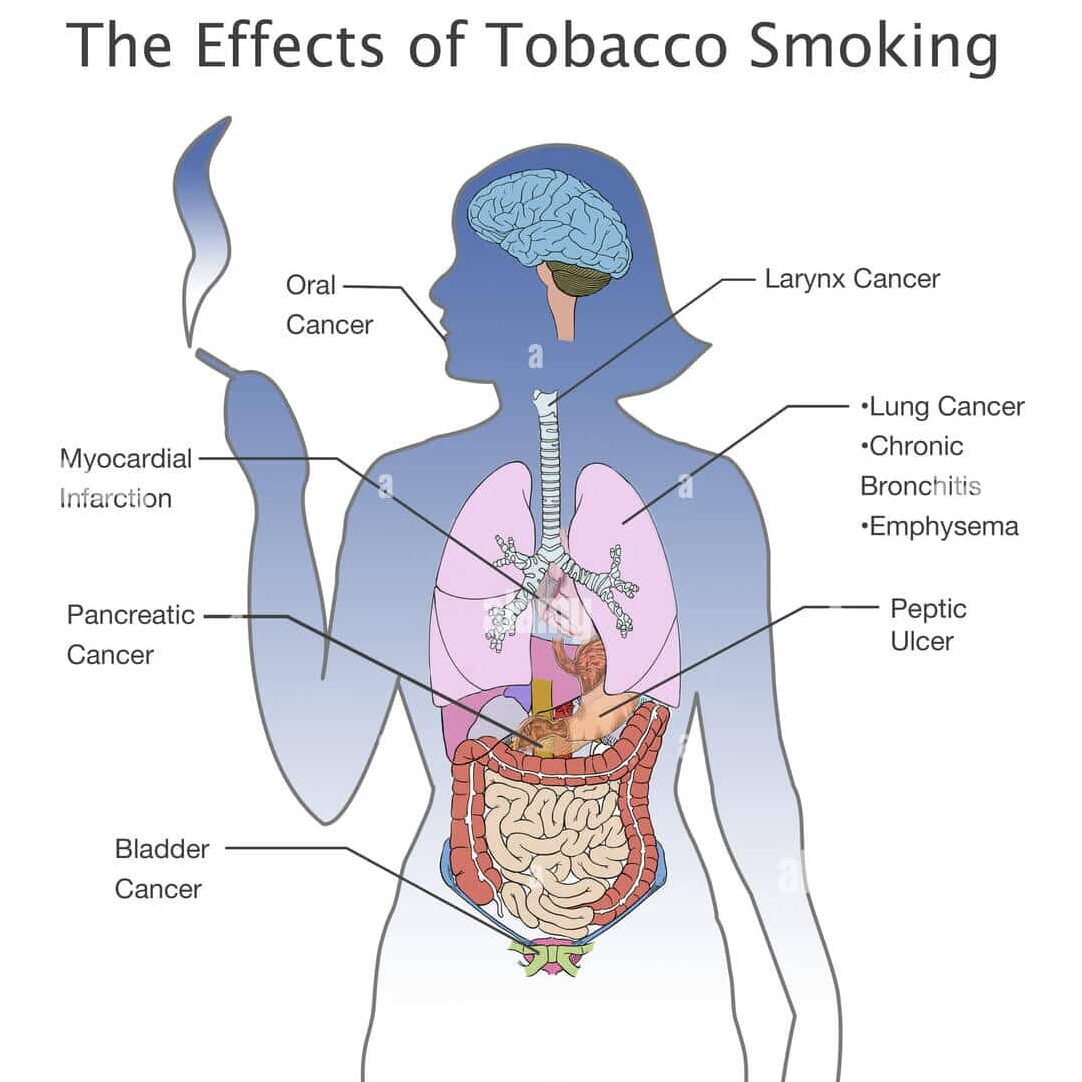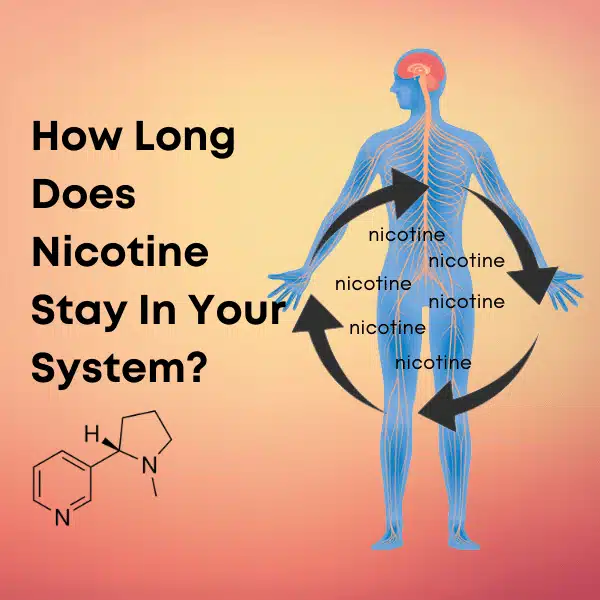How long does Nicotine stay in your System?: Nicotine is a naturally occurring chemical compound found in tobacco plants, as well as in some other plants such as potatoes, tomatoes, and eggplants. It is a highly addictive stimulant drug that affects the central nervous system, which is why it is commonly used in products such as cigarettes, e-cigarettes, and chewing tobacco.
RELATED: How many Chromosomes do Humans have
Table of Contents
When nicotine is ingested, it quickly enters the bloodstream and travels to the brain, where it stimulates the release of the neurotransmitter dopamine, which produces a pleasurable sensation commonly referred to as a “nicotine high.” This effect is what makes nicotine highly addictive, and it can be difficult for people to quit using nicotine products once they become addicted.

Nicotine has both short-term and long-term effects on the body. In the short term, it can cause an increase in heart rate, blood pressure, and respiration rate, as well as a decrease in appetite and a feeling of relaxation. In the long term, it can lead to serious health problems, such as lung cancer, heart disease, and stroke.
Overall, while nicotine may produce some short-term benefits, the long-term consequences of using nicotine products can be severe and potentially life-threatening. It is important for individuals who use nicotine products to be aware of the risks and to consider quitting in order to improve their overall health and well-being.
How long does Nicotine stay in your System?
Nicotine is a highly addictive substance found in tobacco products. When nicotine is consumed, it quickly enters the bloodstream and reaches the brain within seconds, causing feelings of pleasure and relaxation. However, nicotine can also have negative effects on the body, including an increased risk of heart disease, lung cancer, and other health problems.

The question of how long nicotine stays in the system is a common one, and the answer can vary depending on a number of factors. Generally, nicotine has a half-life of approximately two hours, which means that half of the nicotine consumed will be metabolized and eliminated from the body within that time period.
However, it can take several days for all of the nicotine to be fully eliminated from the body. Factors that can influence how long nicotine stays in the system include the amount of nicotine consumed, the frequency of use, the individual’s metabolism, and whether or not the individual is a smoker.
For occasional users, nicotine can be detectable in urine for up to three days after consumption, while regular smokers may have detectable levels of nicotine in their system for up to a week or longer.

It is important to note that even after nicotine has been eliminated from the body, the addictive nature of the substance can make it difficult for individuals to quit smoking or using other tobacco products. Seeking support and resources to quit nicotine use is important for maintaining good health and reducing the risk of long-term health problems associated with tobacco use.
Can doctors tell if you smoke from a blood test?
Yes, doctors can detect whether or not a person has been smoking by analyzing their blood. When a person smokes, the nicotine and other chemicals in tobacco enter their bloodstream and can be detected in a blood test.
In addition to nicotine, blood tests can also detect the presence of other chemicals and substances that are produced by smoking, such as carbon monoxide, which is a toxic gas that is produced when tobacco is burned.
Blood tests can also provide information about a person’s overall health and whether or not they have any conditions or diseases that may be related to smoking, such as lung cancer or heart disease.
Overall, while blood tests can be a useful tool for detecting whether or not a person has been smoking, they are not always foolproof and may not be able to detect smoking in all cases. However, they can provide important information about a person’s health and can be used as part of a larger diagnostic process to help doctors make informed decisions about treatment and care.
How long does one puff of a cigarette stay in your system?
The question of how long one puff of a cigarette stays in your system is a difficult one to answer precisely. When you take a puff of a cigarette, the nicotine, and other chemicals are quickly absorbed through the lungs and into the bloodstream, and then distributed throughout the body.
While the effects of nicotine can be felt almost immediately, the exact amount of time it takes for the nicotine from one puff to be metabolized and eliminated from the body can vary widely depending on a number of factors. These can include the individual’s metabolism, the strength of the cigarette, how deeply the cigarette was inhaled, and whether or not the individual is a regular smoker.
In general, it is estimated that nicotine has a half-life of approximately two hours. This means that, on average, half of the nicotine from one puff of a cigarette will be metabolized and eliminated from the body within two hours. After four hours, approximately three-quarters of the nicotine will have been eliminated, and after six hours, it is estimated that 90% of the nicotine will have been eliminated.
However, it’s important to note that even after the nicotine has been metabolized and eliminated from the body, the harmful chemicals from smoking can continue to cause damage to the body for many years. Quitting smoking is one of the most important things you can do for your health, regardless of how long the effects of one puff of a cigarette may last.
How can you tell if someone is secretly smoking?
If someone is secretly smoking, it can be difficult to tell, as they may take steps to conceal the smell of smoke and other evidence of smoking. However, there are a few signs that may indicate that someone is smoking, even if they are trying to keep it a secret.
1. Smell: One of the most obvious signs of smoking is the smell of smoke on a person’s clothes, hair, or breath. If someone is secretly smoking, they may try to mask this smell with perfume, gum, or mints, but the scent of smoke may still be noticeable.
2. Litter: If you notice cigarette butts or other smoking-related litter in an area where someone is spending time, it may be a sign that they are secretly smoking.
3. Mood changes: Nicotine is a stimulant and can cause changes in mood, including increased irritability or anxiety. If you notice mood changes in someone that seem to coincide with breaks or time away from others, it may be a sign that they are smoking.
4. Physical symptoms: Smoking can cause a variety of physical symptoms, including coughing, shortness of breath, and decreased sense of taste or smell. If you notice these symptoms in someone who is spending time alone or away from others, it may be a sign that they are secretly smoking.
5. Secretive behavior: If someone is being secretive about their whereabouts or activities, it may be a sign that they are trying to conceal smoking. They may suddenly disappear for periods of time or become defensive or evasive when asked about their activities.
It’s important to remember that smoking can be a difficult habit to break, and someone who is secretly smoking may be struggling with addiction or other underlying issues. If you suspect that someone is smoking, it’s important to approach the situation with empathy and understanding and to offer support and resources to help them quit.
What happens if I smoke before a blood test?
If you smoke before a blood test, it can potentially affect the results of the test. Smoking can cause changes in various blood markers and may increase certain substances in the blood, such as carbon monoxide and cotinine (a byproduct of nicotine metabolism).
Carbon monoxide can bind to hemoglobin in the blood and reduce the amount of oxygen that can be carried, leading to falsely elevated levels of certain blood markers that are sensitive to oxygen levels. Cotinine, on the other hand, can be detected in the blood for several days after smoking and may interfere with the accuracy of certain tests that measure substances in the blood.
Therefore, if you are scheduled to have a blood test, it is recommended that you avoid smoking for at least a few hours prior to the test. Ideally, it is best to abstain from smoking for at least 24 hours before the test to ensure that any effects of smoking on the blood markers have subsided.
It’s also worth noting that smoking can have many negative health effects, including an increased risk of lung cancer, heart disease, and other serious health conditions. Quitting smoking is one of the most important things you can do for your health, and even short-term abstinence from smoking before a blood test can have benefits for your overall health and well-being.
Conclusion
In conclusion, identifying whether someone is secretly smoking can be challenging, as they may take steps to conceal the evidence. However, some signs to look out for include the smell of smoke, litter, mood changes, physical symptoms, and secretive behavior. It’s important to approach the situation with empathy and offer support and resources to help the individual quit smoking, as smoking can have serious health consequences and is an addictive habit that can be difficult to break.

